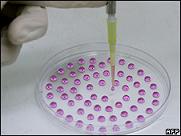Stem Cell
Germany eases law on stem cells
 The German parliament has voted to ease restrictions on embryonic stem cell research, which is controversial on ethical grounds.
The German parliament has voted to ease restrictions on embryonic stem cell research, which is controversial on ethical grounds.
Under the existing German law, researchers have only been allowed to use human embryonic stem cells harvested abroad before January 2002.
But on Friday the Bundestag (lower house) decided by a 346-228 vote to move the cut-off date to May 2007.
Wartime Nazi medical abuses made the issue very sensitive in Germany.
German Research Minister Annette Schavan, a Roman Catholic, said the cut-off date had to be moved forward for Germany to keep pace with technological advances and remain competitive.
Catholic Church leaders have voiced opposition to experiments with human embryos, arguing that all such embryos have the potential to go on to become fully fledged humans.
Researchers believe that stem cells can help in the development of treatments for Parkinson's disease, Alzheimer's disease, diabetes and other illnesses.
(Published by BBC News 11, 2008)